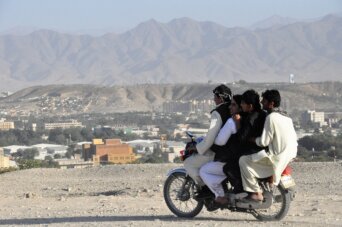- About
- Topics
- Picks
- Audio
- Story
- In-Depth
- Opinion
- News
- Donate
- Signup for our newsletterOur Editors' Best Picks.Send
Read, Debate: Engage.
| topic: | Air Pollution |
|---|---|
| located: | Afghanistan |
| editor: | Shadi Khan Saif |
Would anyone anywhere like to be forced into supporting and promoting the virtues of various green trends by the authorities, and would it yield any substantial results?
With some exception of those criminally involved in polluting the environment for all, this approach is clearly likely to backfire. And, in places like Afghanistan, this is even more certain, despite all the collective benefits.
As one of the sweeping measures to revive the so-called ‘Urban Discipline’ in the Afghan capital Kabul, authorities unfortunately seem more inclined towards enforcing it instead of promoting it in a charming way.
Under the stern directives of vice president Amrullah Saleh, the Kabul Municipality employees together with the armed policemen have removed dozens of roadside merchants and are now after those selling sub-standard coal as well as owners of high-rise buildings emitting smoke.
The VP has also warned to sack top leadership of the Afghanistan Environment Protection Agency in case of failure.
Without any doubt, the urgency is there to dodge the repeat of last winter’s calamity when breathing became literally impossible in Kabul during chilling nights due to the levels of smoke in the air.
Kabul, once a fortified city known for its scenic views of lush valleys and snow-capped mountains has been reduced by decades of war to a teeming and polluted metropolis. In winters, children and the elderly are particularly vulnerable with statistics indicating that close to 20,000 deaths every year are attributed to household pollution, which also contributed to a loss of two years and two months of life expectancy at birth, according to the State of Global Air survey.
With very little industry of its own, Afghanistan contributes to less than 1 per cent of global greenhouse gas emissions. The climate change scenarios, meanwhile, point to temperature increases in the country of 1.4-4 degrees Celsius since 1970, a decrease in rainfall and more irregular precipitation patterns.
Projections by the NEPA suggest that rising temperatures will lead to reduced annual rainfall and higher evapotranspiration, together with more frequent extreme events such as droughts, floods, landslides and avalanches.
So, yes, as a short-term remedy, the police action against polluters can be justified to some extent, but, historically speaking, Afghans have a deep-rooted culture of love for nature. There are plenty of much smarter and sustainable alternatives to encourage people towards taking care of their environment and adopting it as a lifestyle in the long-run.
Many mushrooming urban centres in the country are faced with stems from the fact that green trends are not well-synched with the urban planning, while as it should be, the top priority and the collective society needs to be sensitised to take care of the environment for the generations to come.
Image by Karl Allen Lugmayer

